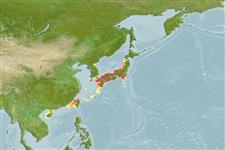Teleostei (teleosts) >
Acropomatiformes (Oceanic basses) >
Lateolabracidae (Asian seaperches)
Etymology: Lateolabrax: Greek, latos, a fish of the Nile + Greek, labrax, -akos = a fish (Dicentrarchus labrax) (Ref. 45335).
Environment: milieu / climate zone / depth range / distribution range
Ecology
Marine; demersal. Temperate
Northwest Pacific: central Japan (Ref. 9137) and South Korea (Ref. 77001).
Size / Weight / Age
Maturity: Lm ? range ? - ? cm
Max length : 94.0 cm TL male/unsexed; (Ref. 40637); max. published weight: 9.1 kg (Ref. 40637)
Adults inhabit shallow rocky areas (Ref. 9137).
Life cycle and mating behavior
Maturities | Reproduction | Spawnings | Egg(s) | Fecundities | Larvae
Masuda, H., K. Amaoka, C. Araga, T. Uyeno and T. Yoshino, 1984. The fishes of the Japanese Archipelago. Vol. 1. Tokai University Press, Tokyo, Japan. 437 p. (text). (Ref. 559)
IUCN Red List Status (Ref. 130435)
Threat to humans
Harmless
Human uses
Fisheries: commercial
Tools
Special reports
Download XML
Internet sources
Estimates based on models
Preferred temperature (Ref.
123201): 14.3 - 23.1, mean 20 °C (based on 149 cells).
Phylogenetic diversity index (Ref.
82804): PD
50 = 1.0000 [Uniqueness, from 0.5 = low to 2.0 = high].
Bayesian length-weight: a=0.01288 (0.00652 - 0.02547), b=3.00 (2.82 - 3.18), in cm total length, based on LWR estimates for this species & (Sub)family-body (Ref.
93245).
Trophic level (Ref.
69278): 3.5 ±0.46 se; based on food items.
Resilience (Ref.
120179): Medium, minimum population doubling time 1.4 - 4.4 years (Preliminary K or Fecundity.).
Fishing Vulnerability (Ref.
59153): High vulnerability (58 of 100).
